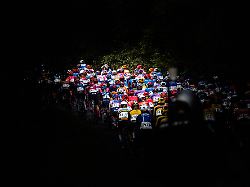“The biggest problem is…”
Saudi millions support revolutionary cycling idea
February 28, 2024, 6:48 a.m
Will teams and professional cyclists soon be missing from the Tour de France? This scenario could occur if the idea behind “One Cycling” triggers massive resistance. This is being financed by the Saudi sovereign wealth fund – and could fundamentally change the sport.
Imagine if the German Football League negotiated a new TV contract – and kept all the money for itself. All games are broadcast free to air. And fans don’t have to pay admission to the stadiums. The clubs would almost exclusively rely on sponsorship money as a source of income. Unthinkable? Naturally. But in cycling, this is exactly what the business model looks like. For decades. That’s why some team bosses see the time as ripe for a revolution.
The “One Cycling” project is intended to reposition the sport economically. More revenue, fairer distribution, a new racing calendar, more stability, more spectacle. The ideas are not new, but what is new is a potentially decisive factor: Arab money. Saudi Arabia’s Public Investment Fund (PIF) is to provide start-up financing of 250 million euros for the project. According to reports, there is already a start date of January 1, 2026.
But there are two main problems that must be solved by then. The race organizers should be brought on board, as should the majority of the teams. “It’s not easy because we’re not all pulling together. The relationship of interests is different than in football,” said Ralph Denk. His Bora-hansgrohe team is one of eight teams that are supporters of “One Cycling”. But 18 teams compete in the WorldTour. “Some of them belong to oligarchs who don’t even care what we do,” said Denk.
“The boat is called cycling”
There is a consensus among the teams that live off sponsorship money that something has to change. “If you want to see a miracle, you should go to Lourdes. But if you want things to change, we have to work in the same direction,” said Patrick Lefevere, the polarizing boss of Soudal-Quick Step. “We’re all rowing in the same boat. The boat is called cycling. If we row in the same direction, the pie grows by 200 percent.”
The first big lever to improve this pie – i.e. revenue – is the racing calendar. It should be streamlined and important races should no longer take place in parallel. “The biggest problem is that the best riders don’t race against each other often enough or consciously avoid each other in the run-up to the Tour de France,” said Denk. He also suggests a simple points system that every fan can use to easily understand who the best driver of the year is.
There should be central marketing when it comes to TV. The organizers are currently concluding their own contracts for their races – and pocketing the money for them. But this also means that smaller races have to pay extra in order to even manage a transmission. “If I can guarantee that the best race against each other more often, I can sell a TV rights package better,” said Denk.
Tour director is against it
The well-known thought games of charging entry fees for the final climbs of the Tour de France are also incorporated into the new business model. Denk made a calculation using the example of a queen stage of the Tour. “The first three mountains are open,” said the manager. “And in Alpe d’Huez, where the race will probably be decided, it costs something. The income is shared between teams and organizers.”
The problem: The ASO, the organizer of the tour, is naturally not enthusiastic. Neither about “One Cycling” nor about the idea of entry fees. Economically understandable, the French would first have to give up some of their income. “The greatest strength of cycling is that it is a freely accessible sport for people on the street. It has to stay that way,” emphasized tour director Christian Prudhomme, who also rejected broadcasts on pay TV: “We only make money, when we have a lot of spectators.”
Convincing the ASO could be the decisive factor for “One Cycling”. In addition to the Tour, the French also organize Paris-Nice, Paris-Roubaix, the Vuelta and the three biggest German races. Without the ASO, the project will die – or go into total confrontation with Saudi money behind it. In the most serious case, this could lead to half of the elite teams missing from the Tour de France. A scenario that no one seriously wants and that would harm cycling rather than help it.
